How I Hire
How I Hire Podcast: Unfiltered conversations with senior GTM leaders revealing their actual strategies for finding, vetting, and attracting exceptional talent. Hosted by Andy Mowat, who’s scaled four unicorns from $10M to $100M+ ARR, each episode uncovers the unwritten playbook for executive hiring that drives exponential growth.
Episodes
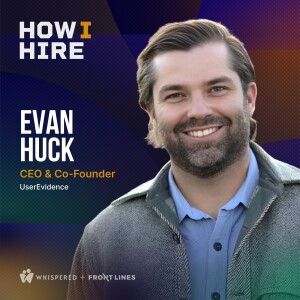
7 days ago
7 days ago
In this episode of How I Hire, Andy Mowat speaks with Evan Huck, CEO & Co-Founder of UserEvidence, about his systematic approach to executive hiring while scaling from zero to 40 employees. As a former AE turned CEO who still interviews every single hire, Evan shares advanced frameworks for role architecture, candidate evaluation differentiation by function, and decision-making processes that prevent costly mis-hires. His methodology reveals how early-stage leaders can maintain hiring excellence while building the foundational team that determines long-term trajectory.
Topics discussed:
The role portfolio methodology for unfamiliar executive functions—how Evan mapped his first VP Marketing hire to 50% product marketing, 30% brand, 20% demand gen by conducting discovery interviews with marketers to understand skill set differences, then matching capabilities to company-specific initiatives rather than generic job descriptions.
Function-specific candidate evaluation strategies that match role requirements—why sales candidates must demonstrate multi-threaded outreach to multiple stakeholders during application (testing core job skills), while engineering candidates should follow standard application processes, with marketing requiring essay-based assessments for writing evaluation.
The rationalization identification framework for preventing mis-hires—distinguishing between candidates who make hiring managers "beaming and stoked" versus those who trigger qualification language like "lots of relevant experience" and "really good at this dimension," which signals dangerous rationalization patterns.
Advanced reference call techniques that extract meaningful differentiation—moving beyond checkbox validation to identify "would hire again" versus "top 1% of my career, would move mountains to work with again" responses, plus recognizing the power signal when employed candidates provide current CEO references.
The Socratic overrule method for maintaining hiring standards without undermining manager autonomy—using inception techniques to challenge enthusiasm levels and test conviction through defensive responses rather than direct vetoes, ensuring A-players hire A-players cascading effect.
Skip-level interview strategy as competitive differentiation—how CEO involvement in non-executive hires becomes a closing tool against competitors while serving as cultural bar-raising, with plans to maintain two-level skip interviews through 300+ employees.
The patience-over-urgency principle with quantified decision frameworks—recognizing that 3 weeks of additional search time prevents 4-6 months of performance management, while offering 2-week decompression periods between roles for tenured candidates to reset before multi-year commitments.
Consulting-style aptitude assessment across all roles using problem-solving scenarios unrelated to specific function—evaluating raw IQ, assumption-laying ability, and "chill humble" cultural fit over experience matching, particularly critical for early-career hires where potential trumps track record.
ABOUT YOUR HOST:
Andy Mowat has built GTM engines for top companies throughout his career. He led Revenue Operations and Demand Gen at four unicorns, including scaling from $10M to $100M ARR at both Upwork and Culture Amp, and helping guide Box and Carta through IPO scale. With a passion for connecting people, Andy has advised executives on their careers for years and launched Whispered to make searching for executive roles less intimidating.
Learn more about about Whispered: www.whispered.com
Interact with AI Andy: www.whispered.com/whisper-search
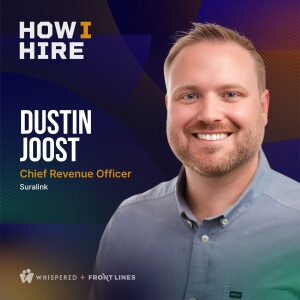
Wednesday Jun 25, 2025
Wednesday Jun 25, 2025
In this episode of How I Hire, Andy Mowat speaks with Dustin Joost, CRO at Suralink, about his systematic approach to breaking traditional hiring patterns that create organizational blind spots. From his experience scaling revenue teams from seed stage through public companies, Dustin reveals how talent market dynamics fundamentally alter recruiting strategies and why the best revenue leaders optimize for stage-fit over industry experience. His frameworks challenge executives to rethink what makes candidates "incredibly deadly" in evolving GTM environments.
Topics discussed:
Why optimizing for "complementary excellence" over carbon copies prevents blind spots as businesses mature, and the specific assessment criteria Dustin uses to identify candidates who fill strategic gaps rather than replicate existing team strengths.
The intellectual curiosity + hunger + self-awareness combination that creates "incredible deadliness" through coachability, including how to evaluate these intangibles during interviews and why this trinity outweighs industry-specific experience for executive hires.
How to implement "just-in-time hiring sprints" with 90-day retrospectives covering channel conversion metrics, bottleneck analysis, and specific SLAs for interviewing committees—treating talent acquisition like product development cycles.
The bench pipeline methodology of maintaining 3-5 pre-vetted candidates through weekly conversations, enabling urgency without lowered standards while staying two quarters ahead of hiring needs based on 90-day average time-to-fill benchmarks.
Why non-traditional backgrounds (teachers managing 30 different learning styles, theater actors mastering tension/payoff storytelling) consistently outperform traditional sales hires in complex category creation and enterprise motions.
The "magic wand friction point" interview question that surfaces cross-functional empathy and systems-level problem-solving in one response, revealing how candidates think about their role in the entire customer journey versus lone-wolf mentalities.
How candidates break through noise using creative outbound tactics—commenting on CRO posts for pattern recognition, leveraging second-degree connections with templated referral messages, and demonstrating sales methodology in their own candidacy approach.
The "strategy, structure, people, process" onboarding framework combined with empowerment-then-monitoring approach, using first 30-60 day execution depth (sales leaders running cycles, marketing leaders joining prospect calls) to distinguish managing-up from genuine impact.
ABOUT YOUR HOST:
Andy Mowat has built GTM engines for top companies throughout his career. He led Revenue Operations and Demand Gen at four unicorns, including scaling from $10M to $100M ARR at both Upwork and Culture Amp, and helping guide Box and Carta through IPO scale. With a passion for connecting people, Andy has advised executives on their careers for years and launched Whispered to make searching for executive roles less intimidating.
Learn more about about Whispered: www.whispered.com
Interact with AI Andy: www.whispered.com/whisper-search
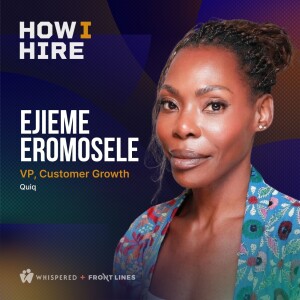
Wednesday Jun 18, 2025
Wednesday Jun 18, 2025
In this episode of How I Hire, Andy Mowat speaks with Ejieme Eromosele, VP of Customer Growth at Quiq, about her systematic approach to evaluating three-dimensional candidate fit and her tactical frameworks for identifying transferable competencies in non-traditional hires. Drawing from her transition from management consulting at Accenture and PwC to customer experience leadership at The New York Times and now scaling customer success at a Series A startup, Ejieme reveals advanced hiring methodologies that prioritize core capabilities over industry experience.
Topics discussed:
How to evaluate three-dimensional candidate fit: role alignment, team maturity (process-builder vs. operator), and company stage matching—including the "machete vs. map" framework for identifying who thrives in ambiguous startup environments.
Why you need three types of references for leadership hires: manager, peer, and direct report perspectives that reveal candidates who manage up brilliantly but "elbow and knife" their peers to get ahead.
The "keep it real" pre-offer conversation that prevents misaligned hires—inspired by Ejieme's CEO taking her to lunch to honestly explain startup chaos before she joined, saving both parties from a costly mistake.
How top candidates differentiate themselves by explaining your company through customer pain points rather than product features, plus Ejieme's go-to question: "Tell me about a time a customer changed your point of view."
The onboarding template that accelerates cross-functional relationships by pre-mapping new hires to key stakeholders with specific conversation topics, turning generic coffee chats into strategic relationship building.
How to identify transferable skills in atypical hires by focusing on core competencies (leadership, relationship development, business acumen) rather than industry experience—the approach that got Ejieme her first VP role in tech.
Why AI is creating both smarter candidates and more hiring noise, plus tactical considerations for screening authenticity when candidates over-leverage AI research for interviews.
Real-world case study of redesigning roles when AI eliminates 50% of tasks—how Ejieme is creating a hybrid AM/RevOps position and applying the "scale rules" principle for sustainable growth.
ABOUT YOUR HOST:
Andy Mowat has built GTM engines for top companies throughout his career. He led Revenue Operations and Demand Gen at four unicorns, including scaling from $10M to $100M ARR at both Upwork and Culture Amp, and helping guide Box and Carta through IPO scale. With a passion for connecting people, Andy has advised executives on their careers for years and launched Whispered to make searching for executive roles less intimidating.
Learn more about about Whispered: www.whispered.com
Interact with AI Andy: www.whispered.com/whisper-search
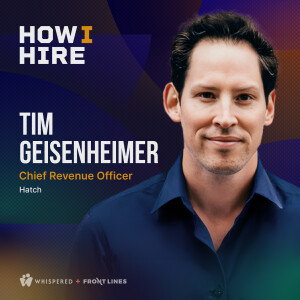
Tuesday Jun 03, 2025
Tuesday Jun 03, 2025
In this episode of How I Hire, Andy Mowat speaks with Tim Geisenheimer, CRO at Hatch, about building high-performing outbound sales teams in the AI era. Drawing from his experience scaling revenue organizations at Twitter, Correlated, and now Hatch, Tim shares tactical frameworks for identifying candidates who thrive in phone-centric environments, conducting scientific reference checks, and managing complex interview processes. His insights reveal how successful CROs are adapting their hiring strategies while maintaining focus on fundamental sales fundamentals that AI hasn't disrupted.
Topics discussed:
Why cold calling remains the dominant channel for B2B enterprise sales despite AI advancement, and how to screen SDRs specifically for phone-centric roles rather than multi-channel generalists.
The "stretch candidate" philosophy borrowed from Jason Lemkin—when to hire someone who hasn't seen your exact growth story before versus requiring proven pattern recognition at your stage and scale.
How to conduct "back-channel" reference checks by intentionally seeking out former colleagues the candidate didn't recommend, and the specific questioning framework that removes hiring bias to focus on management optimization.
The tactical approach to managing multiple candidates through lengthy interview processes—treating it like fundraising orchestration with transparent communication about timelines and decision points.
Why the best senior candidates proactively reach out with personalized research about specific open roles, and how this simple outbound tactic works because so few executives actually do it.
The intellectual curiosity framework for identifying early onboarding red flags—specifically looking for bias-to-action and self-directed learning within the first two weeks at fast-growing companies.
How AI tools like ChatGPT's O3 have raised the baseline expectation for candidate research, making company and role preparation non-negotiable rather than impressive.
The counterintuitive onboarding philosophy for 100-person startups that balances structured enablement with self-directed discovery, expecting new hires to schedule their own CEO meetings and cross-functional conversations.
ABOUT YOUR HOST:
Andy Mowat has built GTM engines for top companies throughout his career. He led Revenue Operations and Demand Gen at four unicorns, including scaling from $10M to $100M ARR at both Upwork and Culture Amp, and helping guide Box and Carta through IPO scale. With a passion for connecting people, Andy has advised executives on their careers for years and launched Whispered to make searching for executive roles less intimidating.
Learn more about about Whispered: www.whispered.com
Interact with AI Andy: www.whispered.com/whisper-search
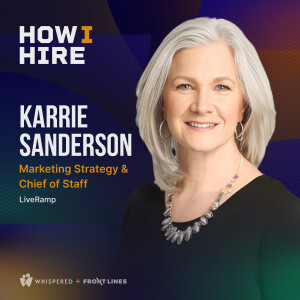
Monday May 19, 2025
Monday May 19, 2025
In this episode of How I Hire, Andy Mowat speaks with Karrie Sanderson, Marketing Strategy/Chief of Staff at LiveRamp, about her distinctive approach to building exceptional marketing teams. Drawing from her diverse experience at leading brands including Coca-Cola, Starbucks, Pfizer, Smartsheet, and Typeform, Karrie shares frameworks for identifying talent gaps, evaluating candidates beyond traditional metrics, and navigating today's employer-friendly market. Her insights reveal how strength-based leadership can transform both hiring processes and team dynamics.
Topics Discussed:
How departures of senior talent create strategic opportunities to reassess organizational structure rather than simply backfilling the same role without evaluation.
Why LiveRamp's "hungry, humble, smart" framework identifies candidates with the right balance of curiosity, humility, and emotional/organizational intelligence needed for senior roles.
How Coca-Cola's strength-based team building methodology creates complementary leadership teams where diversity of strengths leads to more effective problem-solving and innovation.
Why posting senior roles publicly can generate 2,000-3,000 applications, and the tactical approach to leveraging 8-12 specialized Slack communities as filtered talent pools.
The critical importance of handling candidate rejections professionally, especially for senior roles where "ghosting" qualified candidates can damage employer brand in tight-knit industries.
Why the traditional categorization of CMOs as brand, demand gen, or product marketing specialists creates an artificial framework that sets marketing leaders up for failure.
How a "people first" onboarding strategy that invests 2-3 weeks in relationship building accelerates long-term performance despite seeming counterintuitive when roles have been vacant.
Why passive candidates often make superior hires because they're "running to" rather than "running from" opportunities, and how to adjust evaluation criteria for their different engagement patterns.
The diminishing value of case studies and take-home assignments when hiring senior executives in competitive markets, and more effective alternatives for assessing strategic thinking.
ABOUT YOUR HOST:
Andy Mowat has built GTM engines for top companies throughout his career. He led Revenue Operations and Demand Gen at four unicorns, including scaling from $10M to $100M ARR at both Upwork and Culture Amp, and helping guide Box and Carta through IPO scale. With a passion for connecting people, Andy has advised executives on their careers for years and recently launched Whispered to make searching for executive roles less intimidating.
Learn more about about Whispered: www.whispered.com
Interact with AI Andy: www.whispered.com/whisper-search


